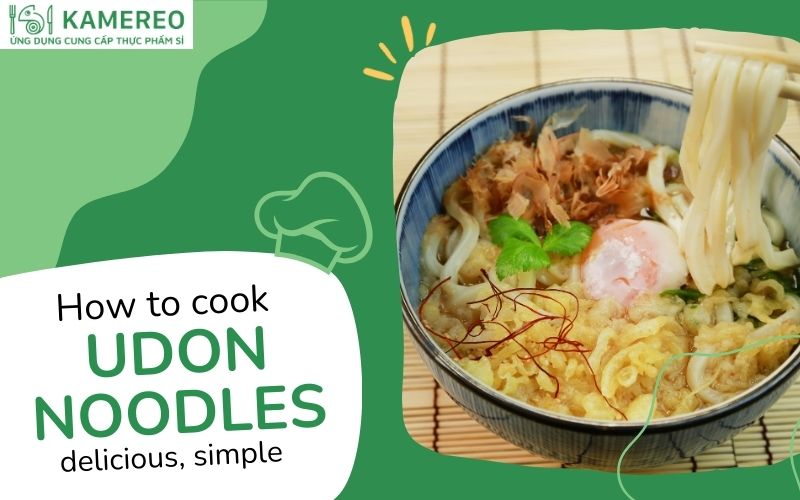Japanese udon noodles are famous as a delicious dish characterized by thick, soft noodles and diverse cooking methods. From refreshing cold noodles for summer days to warm hot noodles for winter, udon always wins the hearts of many diners. To make it yourself at home, don’t miss the detailed information on how to cook udon noodles with a rich traditional flavor that Kamereo shares right below!
⛩ This article belongs to the JAPANESE FOOD CULTURE series
This is a series of articles sharing interesting knowledge about the culture, dishes, and authentic recipes of the Land of the Rising Sun.
How to Cook Beef Udon Noodles
Ingredients
- Udon noodles: 150g
- Beef: 200g
- Dashi seasoning: 1 packet
- Japanese bonito flakes: 5g
- Kelp: 3g
- Scallions: 3 stalks
- Onion: 1 bulb
- Japanese fish cake
- Parsley
- Cooking oil
- Udon noodle seasoning: Mirin, soy sauce, sake
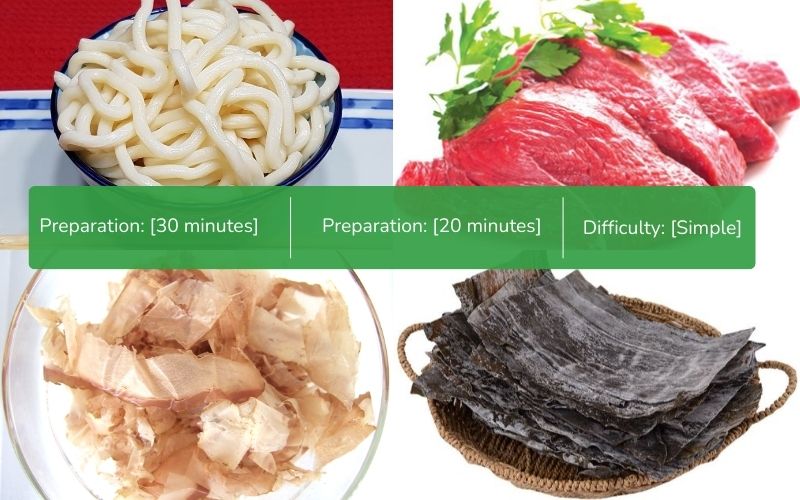
Delicious and high-quality beef udon noodle ingredients at Kamereo:
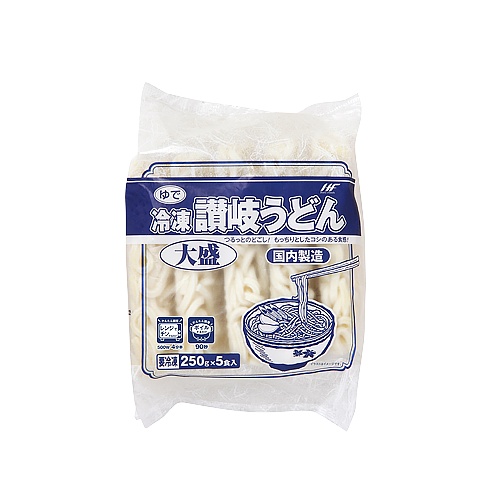
Frozen Thick Udon Noodles 1.25kg
79,000đ/PACK
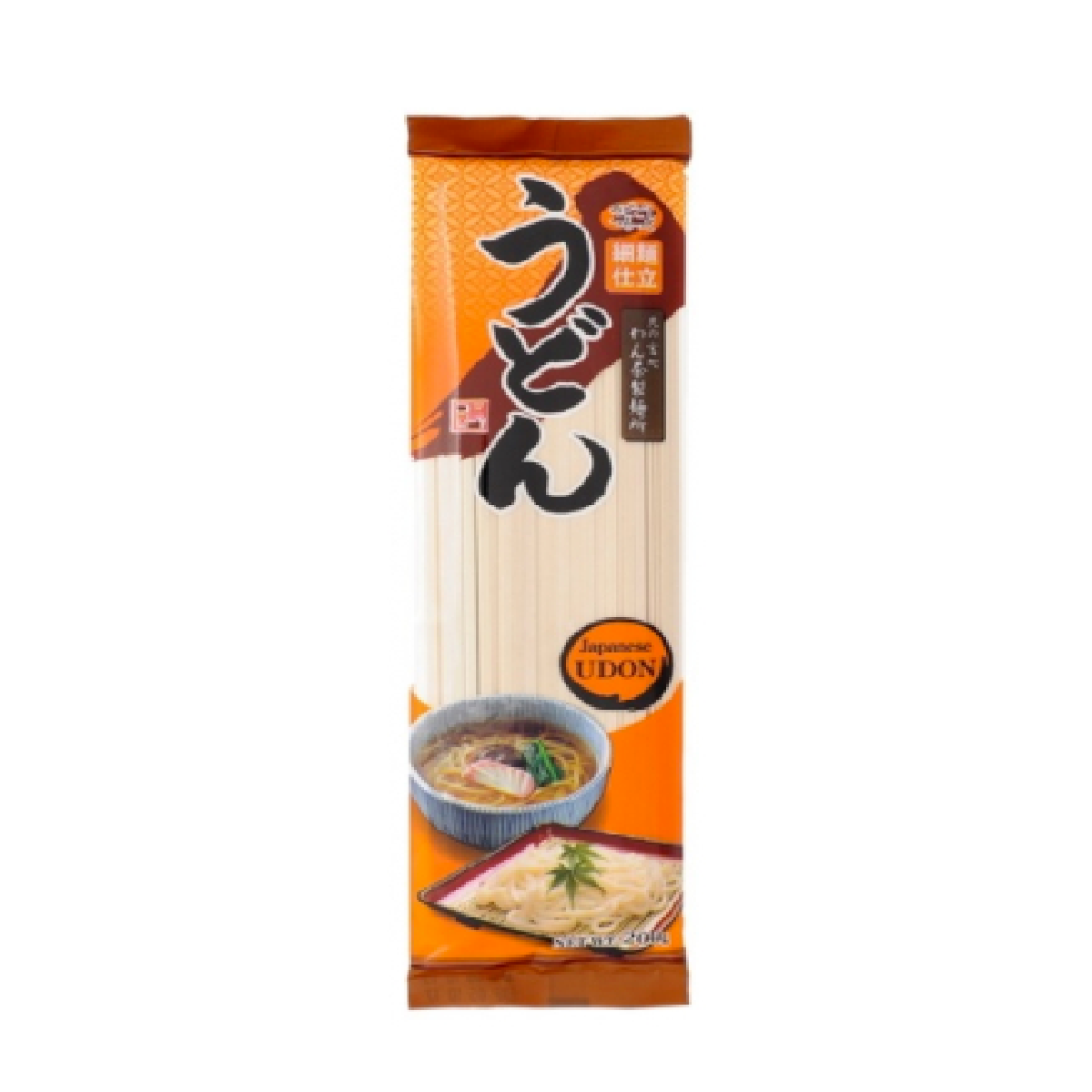
Udon Yamamori 200g
39,000đ/PACK
46,000đ/PACK
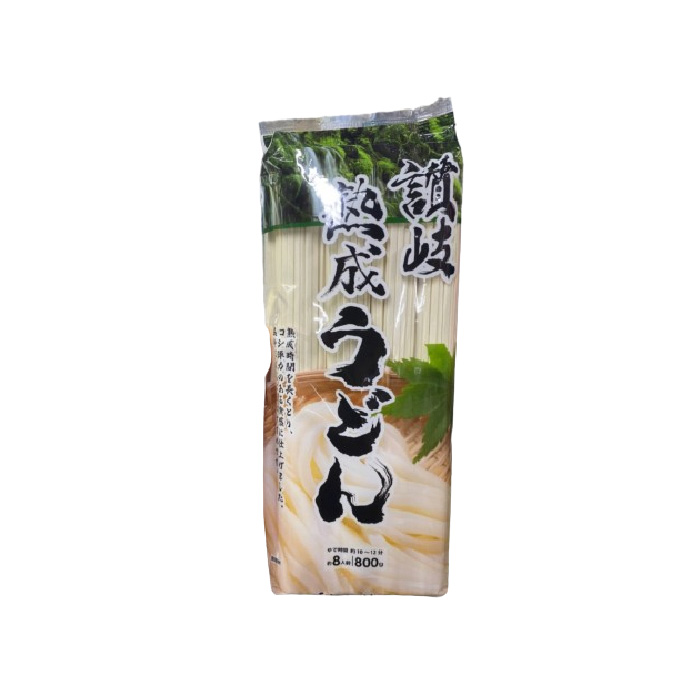
Sanuki Udon Noodles 800g
79,000đ/PACK
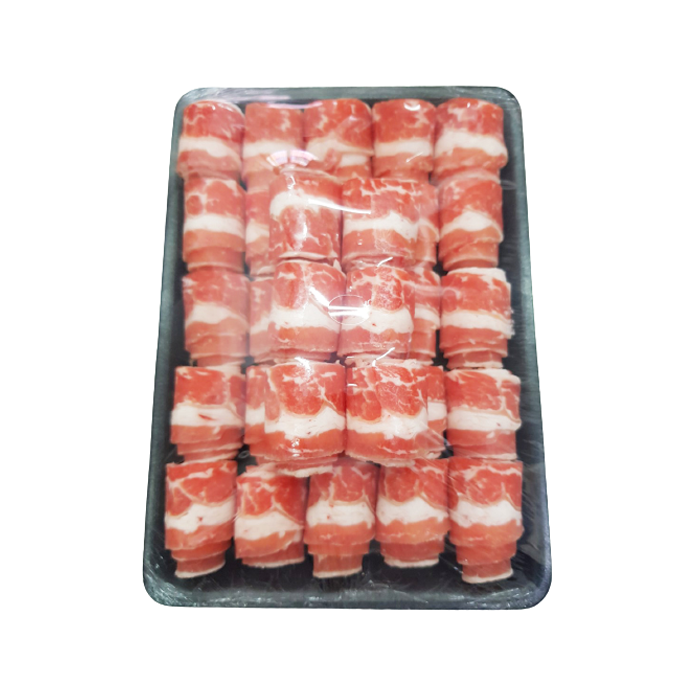
Frozen USA Beef Short Plate 450g-550g (Cut 2mm)
129,000đ/PACK
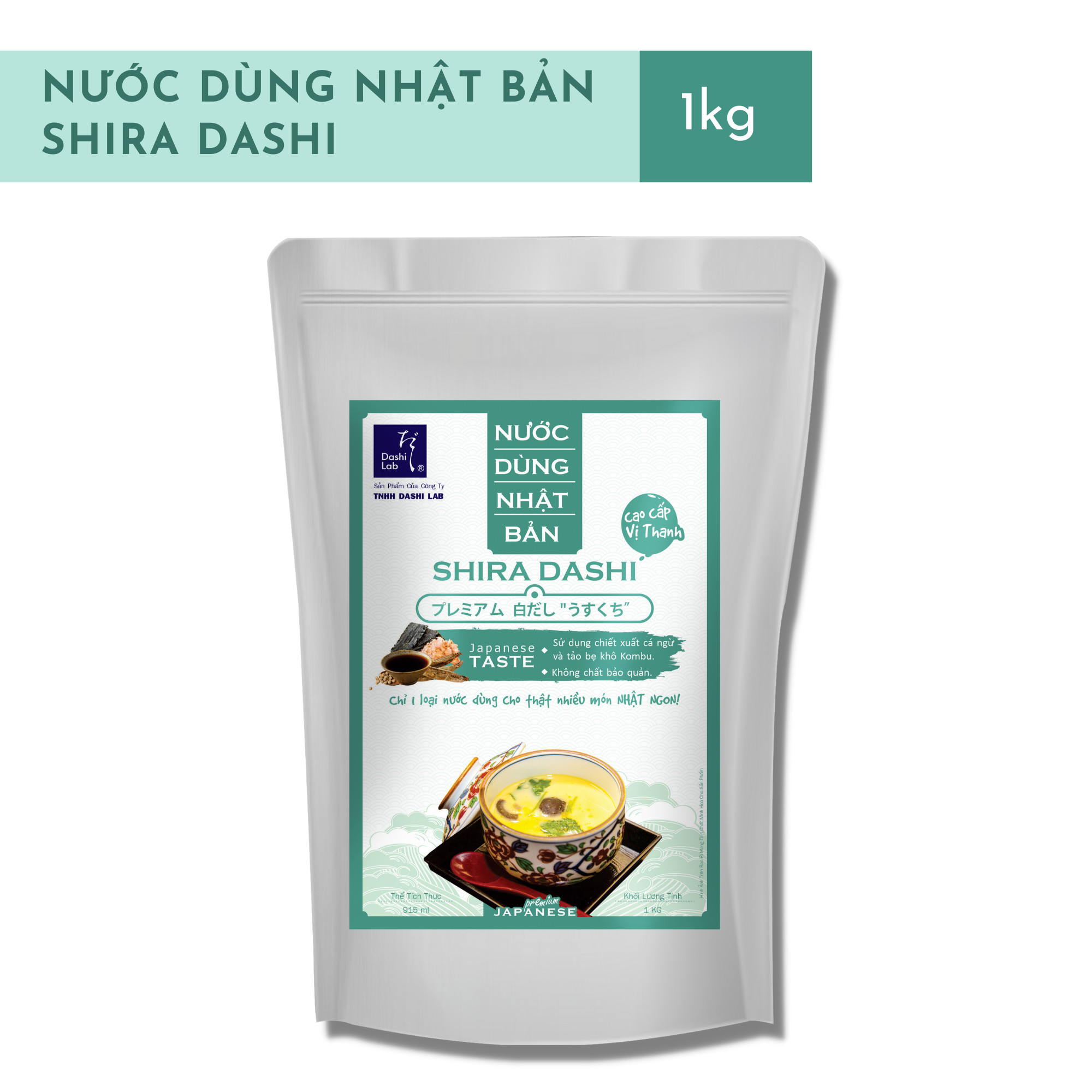
Japanese Premium Shira Dashi 1kg
329,000đ/PACK
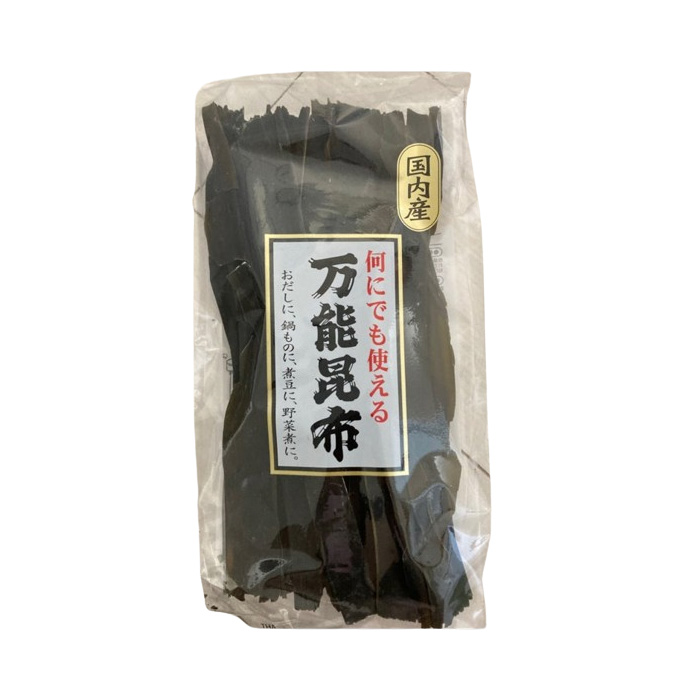
Kombu Dried Kelp 110g
120,000đ/PACK
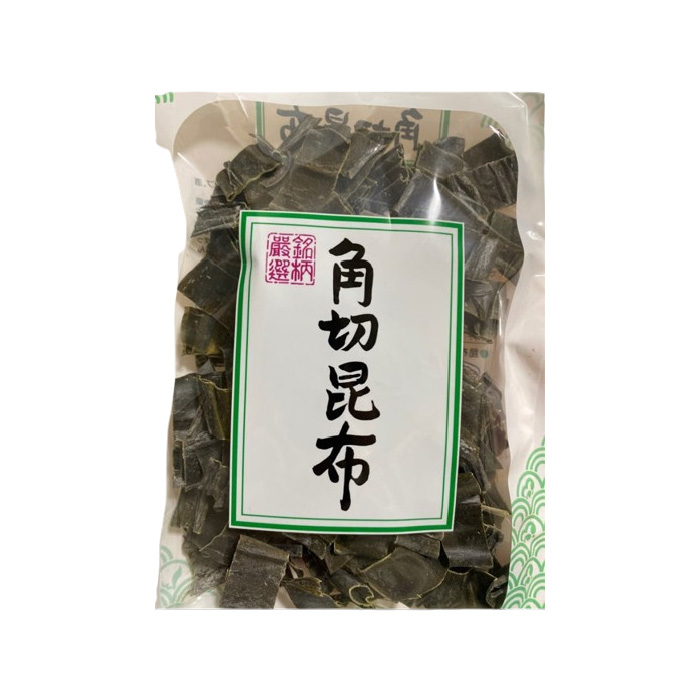
Dried Kelp Cut Into Small Pieces 90g
120,000đ/PACK

Green Onion Da Lat
35,000đ/KILOGRAM
45,500đ/KILOGRAM
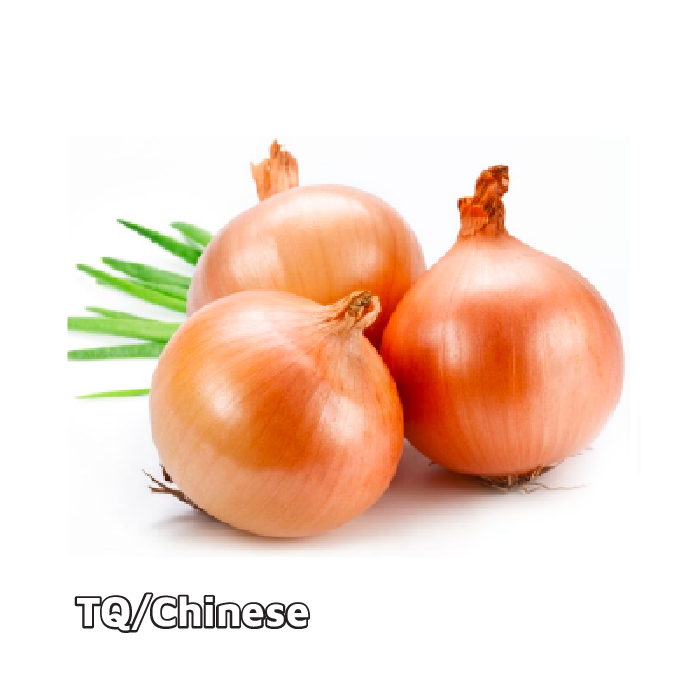
Onion Big Size
18,000đ/KILOGRAM
22,000đ/KILOGRAM
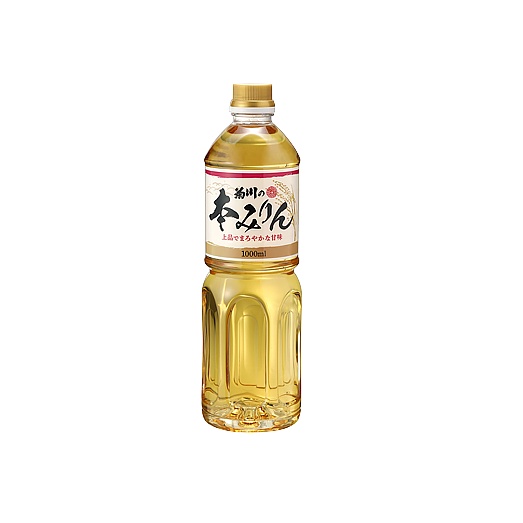
Hon Mirin Cooking Seasoning 1L
85,000đ/BOTTLE
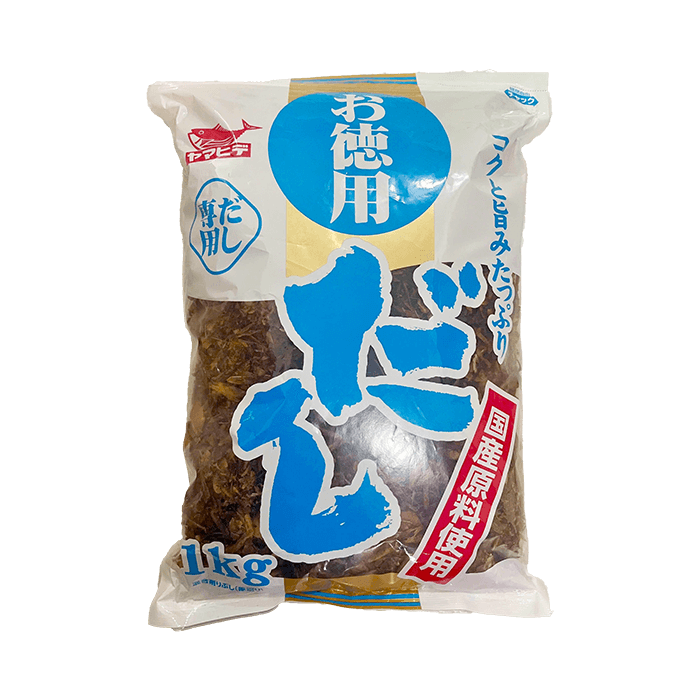
Dashi Broth Ingredients: Mixed Dried Sliced Fish 1kg
360,000đ/PACK
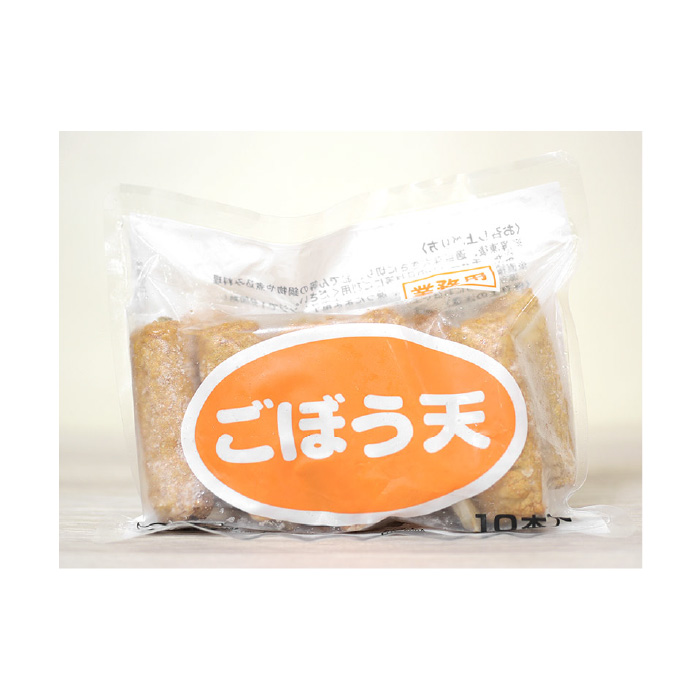
Fish Cake Burdock Rolls 300g (10 Pieces/ Pack)
57,400đ/PACK
82,000đ/PACK
Instructions
To make delicious and authentic Japanese-flavored beef seaweed udon noodles at home, you can refer to the following detailed steps and important notes:
Step 1: Prepare fresh ingredients
- Beef: After buying, wash the beef thoroughly with water and a little salt to remove impurities. Next, let the beef drain completely before slicing it into thin, bite-sized pieces.
- Scallions: Remove the roots, wash the scallions under running water, and chop finely for garnish and to enhance the flavor of the dish.
- Onion: Peel the onion, wash it, and slice it thinly. The onion will be sautéed to add flavor to the beef.
- Parsley: Pick the young leaves, wash them, and let them drain. Parsley is often used for decoration, adding an attractive color to the noodles.
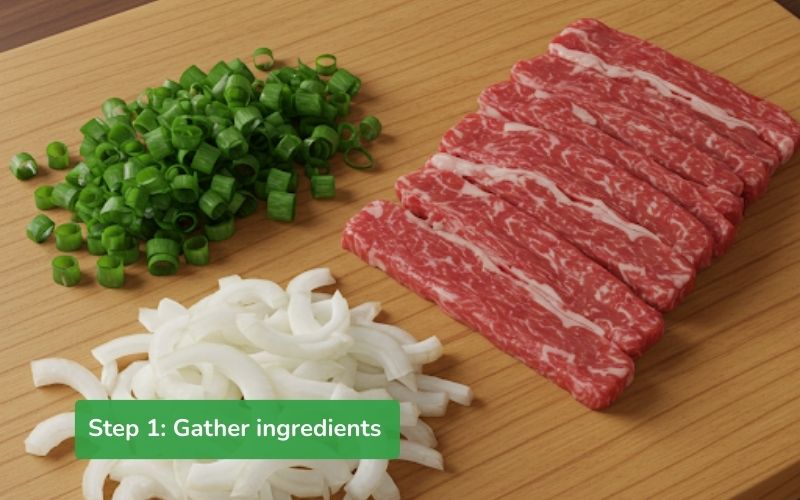
Step 2: Cook the rich dashi broth
- Prepare a pot and add about 500ml of filtered water.
- Add the dashi seasoning packet, 2.5g of Japanese bonito flakes, and 3g of dried kelp to the pot of water.
- Bring the mixture to a boil over medium heat for about 10 minutes to allow the ingredients to release their flavor.
- Once the broth has reached the desired richness, remove the kelp and seasoning packet from the pot.
- Season the broth with 1 tablespoon of mirin, 1.5 tablespoons of soy sauce, ⅔ tablespoon of sugar, and 1 teaspoon of salt.
- Finally, taste and adjust the seasoning of the broth to your liking.
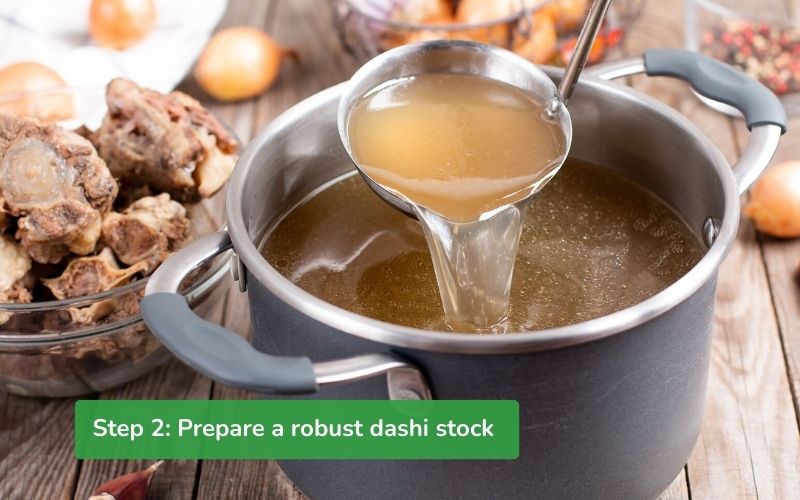
💡 During the cooking process, you need to skim off the foam regularly to make the broth clear and lighter.
Step 3: Sauté the fragrant beef
- Place a pan on the stove and add 1 tablespoon of cooking oil. Wait until the oil is hot.
- Add the sliced onions to the pan and stir-fry for about 4 minutes until the onions become fragrant and turn a beautiful golden color.
- Next, add the sliced beef to the pan and stir-fry quickly.
- Season the beef with ½ tablespoon of sugar, 1 tablespoon of soy sauce, 1 tablespoon of sake, 1 tablespoon of mirin, and 1 teaspoon of salt.
- Stir well until the beef is cooked through and evenly coated with the seasoning.

💡 To keep the beef tender and sweet, you should stir-fry it until just cooked; avoid overcooking, which will make the beef tough and chewy.
Step 4: Boil the udon noodles
- Bring another pot of water to a boil on the stove.
- Once the water is boiling, add the udon noodles and cook for about 2 minutes.
- After the noodles are cooked through, remove them and let them drain.
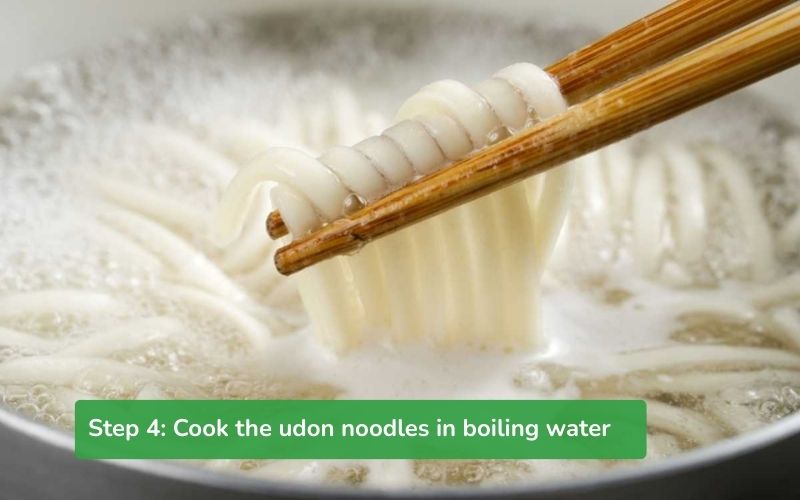
💡 If you are using fresh udon noodles, you can skip this boiling step. Or, to make the noodles hotter, you can briefly blanch them in boiling water.
Step 5: Complete and enjoy the beef udon noodle dish
- Put the cooked udon noodles into a bowl.
- Pour the hot dashi broth over the noodles.
- Add the stir-fried beef and sliced Japanese fish cake to the bowl.
- Finally, sprinkle the chopped scallions on top for garnish and to enhance the flavor.
- Enjoy the beef udon noodle dish while it’s still hot to fully experience its delicious and appealing flavor.
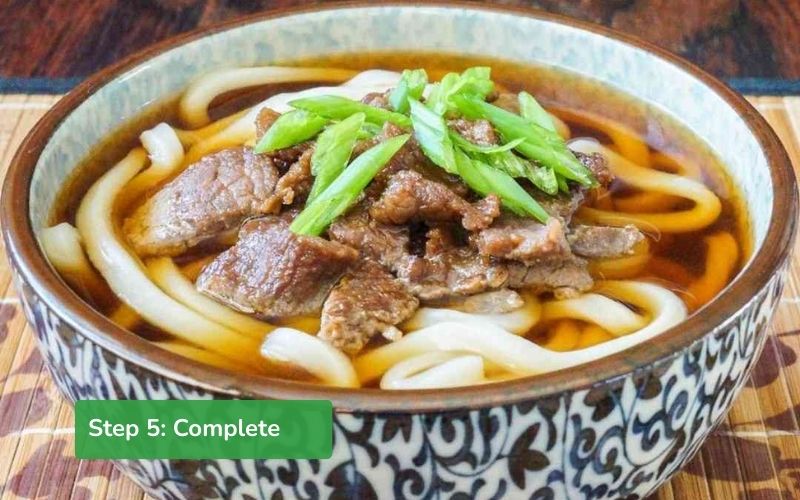
How to Make Spicy Stir-Fried Udon Noodles
Ingredients
- Udon noodles: 150g
- Onion: 1/2 bulb (thinly sliced)
- Garlic: 2 cloves (thinly sliced)
- Scallions: 2 sprigs (chopped)
- Sesame oil: 1 tablespoon
- Soy sauce: 1 tablespoon
- Seasoning powder: a little
- Chili powder: 1 tablespoon
- Cooking oil: 2 tablespoons

Buy authentic Japanese spicy stir-fried udon noodle ingredients at Kamereo:

Udon Yamamori 200g
39,000đ/PACK
46,000đ/PACK

Frozen Thick Udon Noodles 1.25kg
79,000đ/PACK
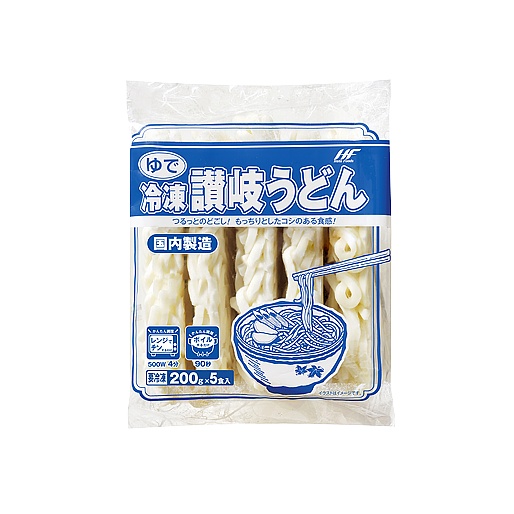
Frozen Udon Noodles 1kg
83,000đ/PACK

Sanuki Udon Noodles 800g
79,000đ/PACK

Onion Big Size
18,000đ/KILOGRAM
22,000đ/KILOGRAM
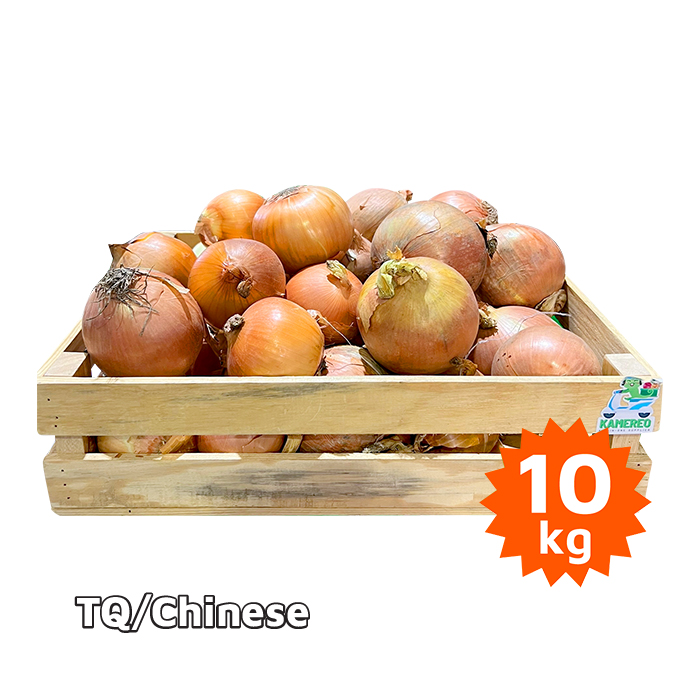
Onion Big Size (10kg/ Pack)
175,000đ/PACK
196,000đ/PACK
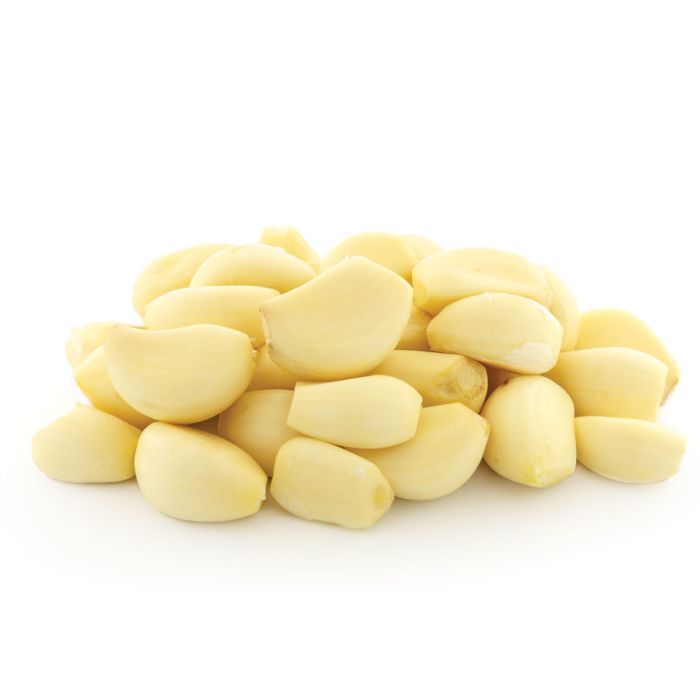
Peeled Garlic
75,000đ/KILOGRAM
90,000đ/KILOGRAM
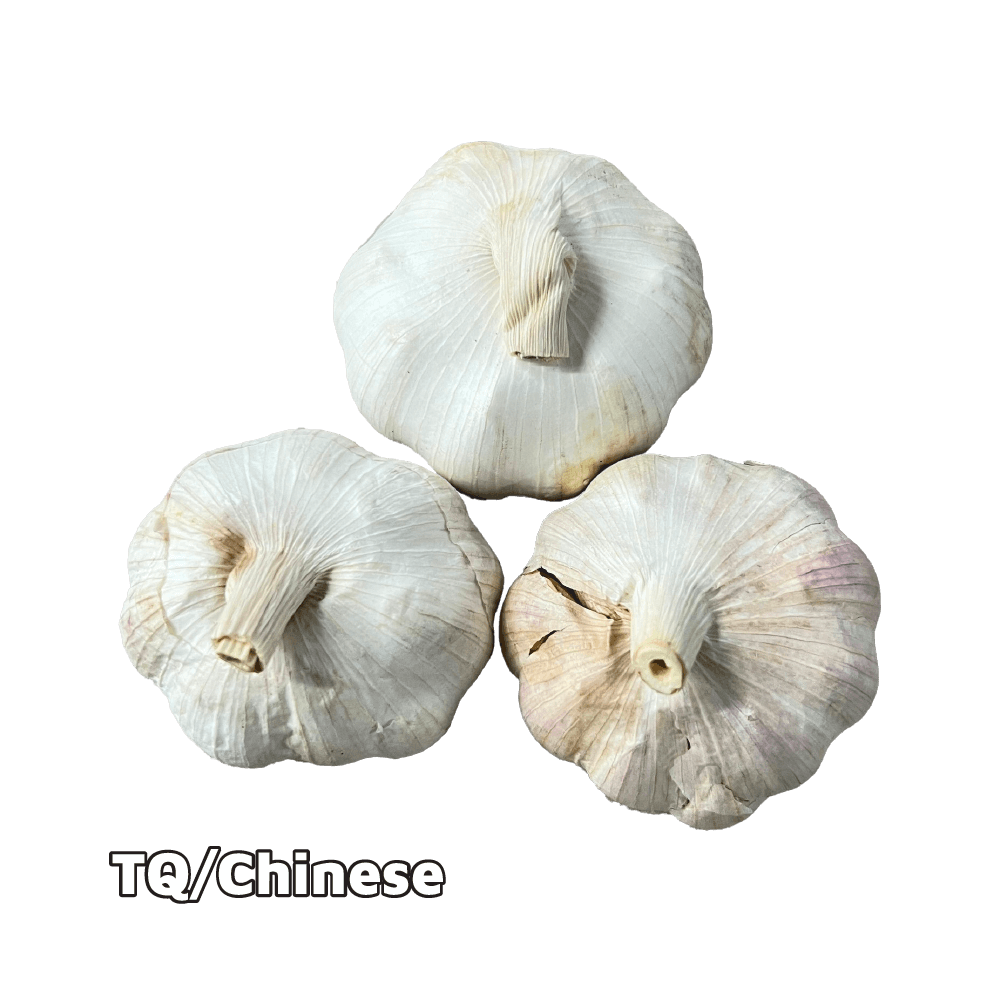
Garlic Big Size
59,000đ/KILOGRAM

Green Onion South
45,000đ/KILOGRAM

Nakydaco Sesame Oil 250ml
63,000đ/BOTTLE

Lee Kum Kee Sesame Oil 207ml
80,000đ/BOTTLE
101,000đ/BOTTLE

Chili Powder 1kg
175,000đ/PACK
Instructions
If you intend to make delicious spicy stir-fried udon noodles at home, you can refer to the detailed preparation steps including:
Step 1: Prepare the rich stir-fry sauce
- To create the characteristic flavor for the dish, prepare the stir-fry sauce by combining the following seasonings in a bowl: 1 tablespoon of soy sauce, 1 tablespoon of sesame oil, 1 tablespoon of chili powder, and 1/2 tablespoon of seasoning powder. 1
- Stir the mixture well until the seasonings are completely dissolved, forming a smooth and fragrant mixture.
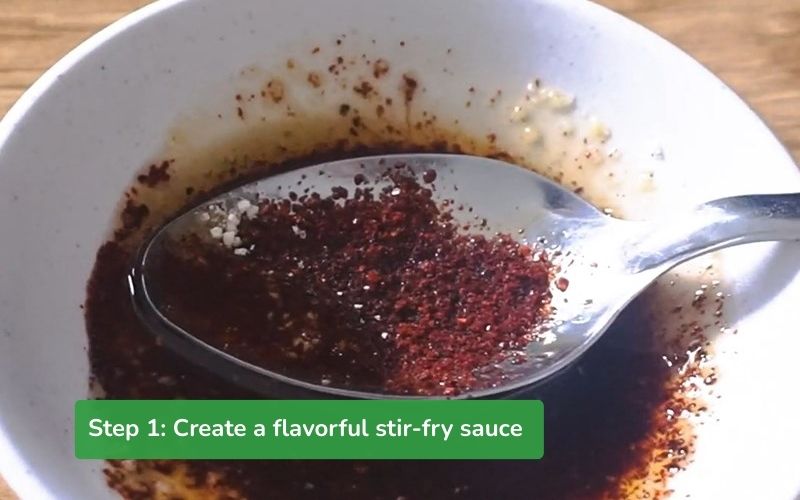
Step 2: Prepare the ingredients
- After peeling the onion, it needs to be thinly sliced horizontally, with a moderate thickness of about 1/2 a small finger joint. Horizontal slicing helps the onion cook evenly and retain its natural sweetness.
- For dried udon noodles, put a pot of water on the stove and bring it to a boil. Once the water is boiling, briefly blanch the udon noodles for about 30 seconds.
- Remove the noodles immediately and let them drain to prevent them from becoming mushy and sticking together when stir-frying.
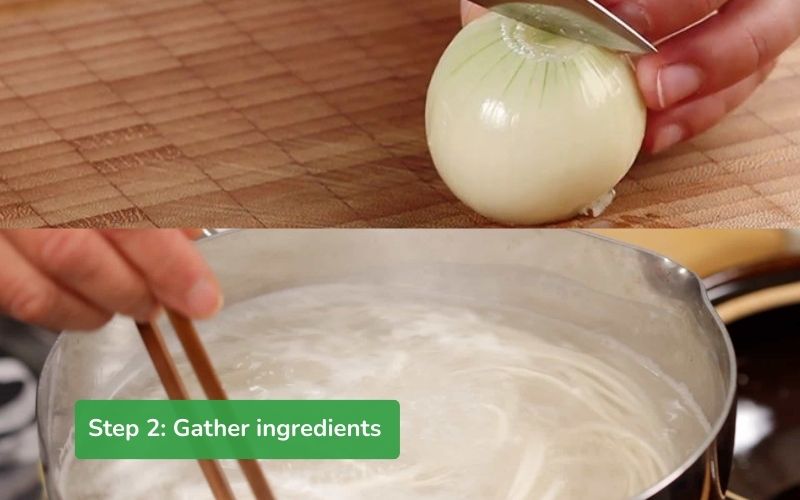
💡 Here’s how to cut onions without tearing up:
- Soaking onions in cold water before cutting is a small trick that helps remove some of the enzymes that cause eye irritation present in onions.
- Due to the characteristic tubular structure of onions, always cut horizontally to minimize the release of onion droplets that can irritate the eyes.
- Absolutely do not cut off both ends of the onion before slicing, as the sulfur compounds that cause eye irritation are concentrated in the root. Keeping both ends intact will help minimize eye irritation during preparation.
Step 3: Stir-fry the udon noodles
- Place a pan on the stove and add 2 tablespoons of cooking oil. Wait until the oil is hot.
- Sauté 2 thinly sliced garlic cloves in the hot oil to create a characteristic aroma for the dish.
- Add the prepared onions to the pan and stir-fry until they begin to soften and turn translucent.
- Next, slowly pour the prepared sauce mixture into the pan, stirring well to coat the onions with the sauce.
- Add 2 chopped scallion sprigs to the pan to add a fresh flavor to the dish.
- Then, add the drained udon noodles to the pan, stirring gently but evenly so that the noodles separate and are evenly coated with the sauce.
- Taste and adjust the seasoning to your liking.
- When the noodles are evenly coated with the sauce and hot, turn off the heat and arrange the noodles on a plate to enjoy.

Step 4: Finished product
The finished spicy stir-fried udon noodle dish will bring a unique combination of flavors: chewy and delicious udon noodles, mixed with the spicy and rich sauce, and the natural sweet aroma of onions.
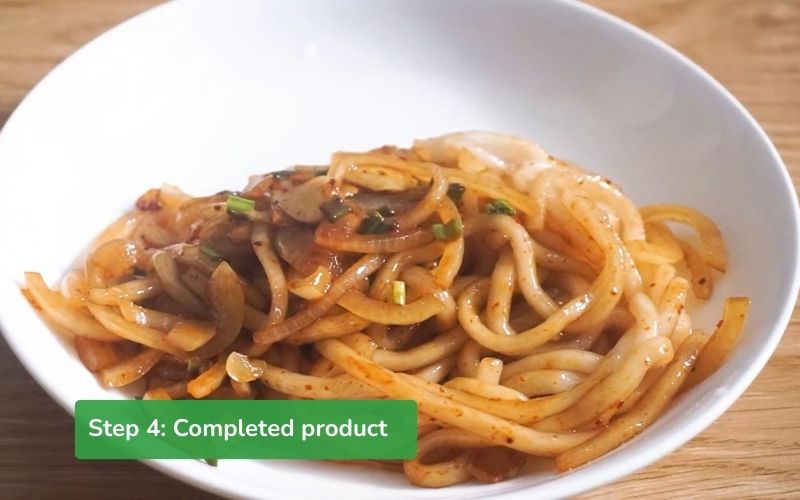
Japanese-Style Mixed Udon Noodle Recipe
Ingredients
- Udon noodles: 1 pack
- Egg: 1
- Dried seaweed: a small amount
- Leek: 1
- Korean chili paste: 2 teaspoons
- Soy sauce: 2 teaspoons
- Sesame oil: 1 teaspoon
- Seasoning granules: a small amount
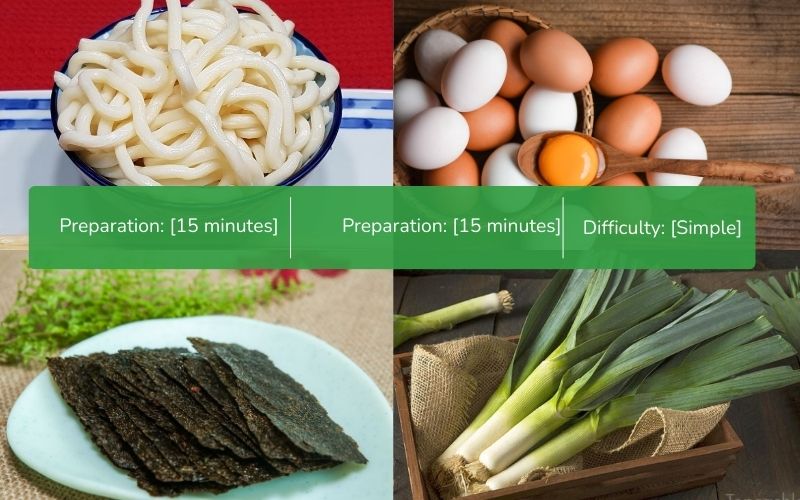
Purchase udon noodle ingredients at good prices, Japanese standard at Kamereo:

Udon Yamamori 200g
39,000đ/PACK
46,000đ/PACK

Frozen Thick Udon Noodles 1.25kg
79,000đ/PACK

Frozen Udon Noodles 1kg
83,000đ/PACK
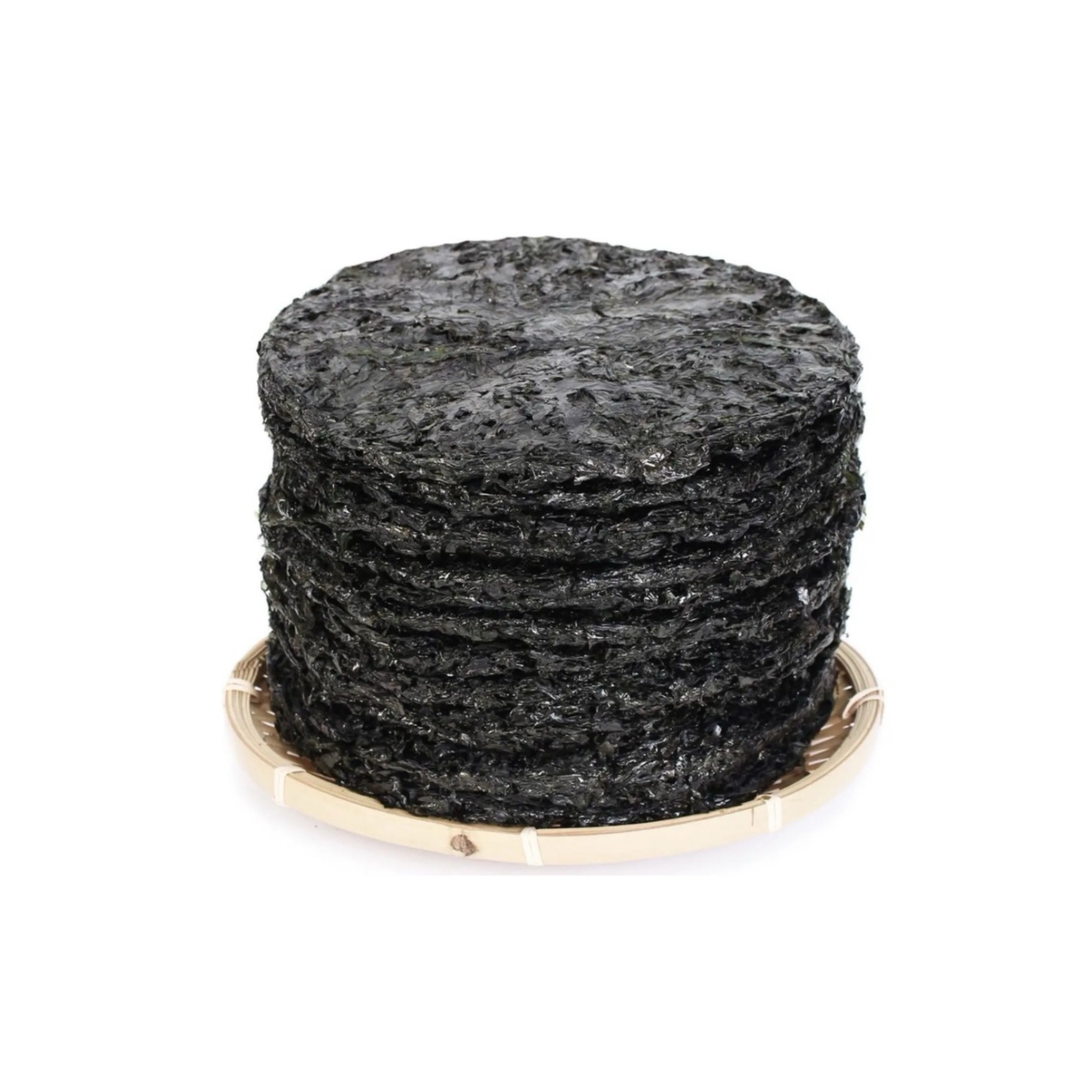
Dried Seaweed 500g
179,000đ/PACK
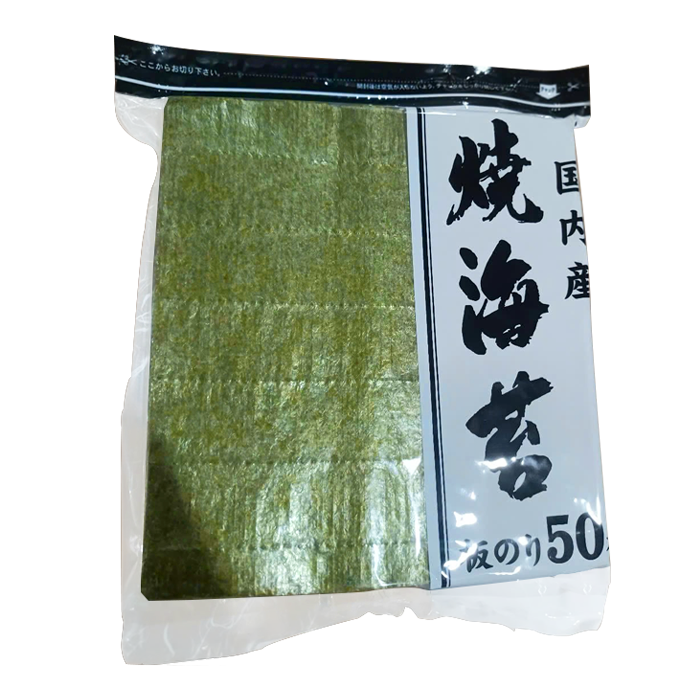
Sekiguchi Dried Seaweed (50 Sheets)
295,000đ/PACK
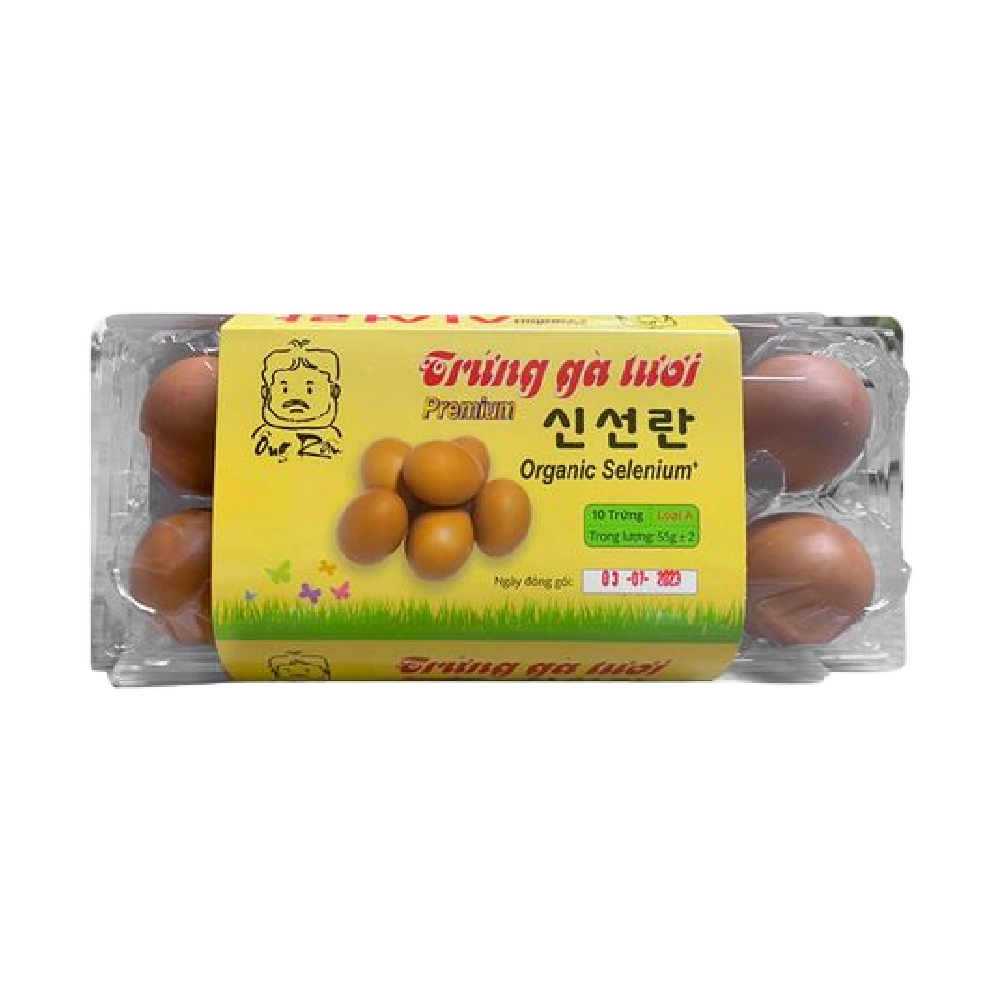
GFoods Chicken Egg 55g 10 Eggs/ Box
25,000đ/BOX
30,500đ/BOX

CP Chicken Egg 54g 10 Eggs/ Box
33,500đ/BOX
41,500đ/BOX
Leek Without Leaves
55,000đ/KILOGRAM
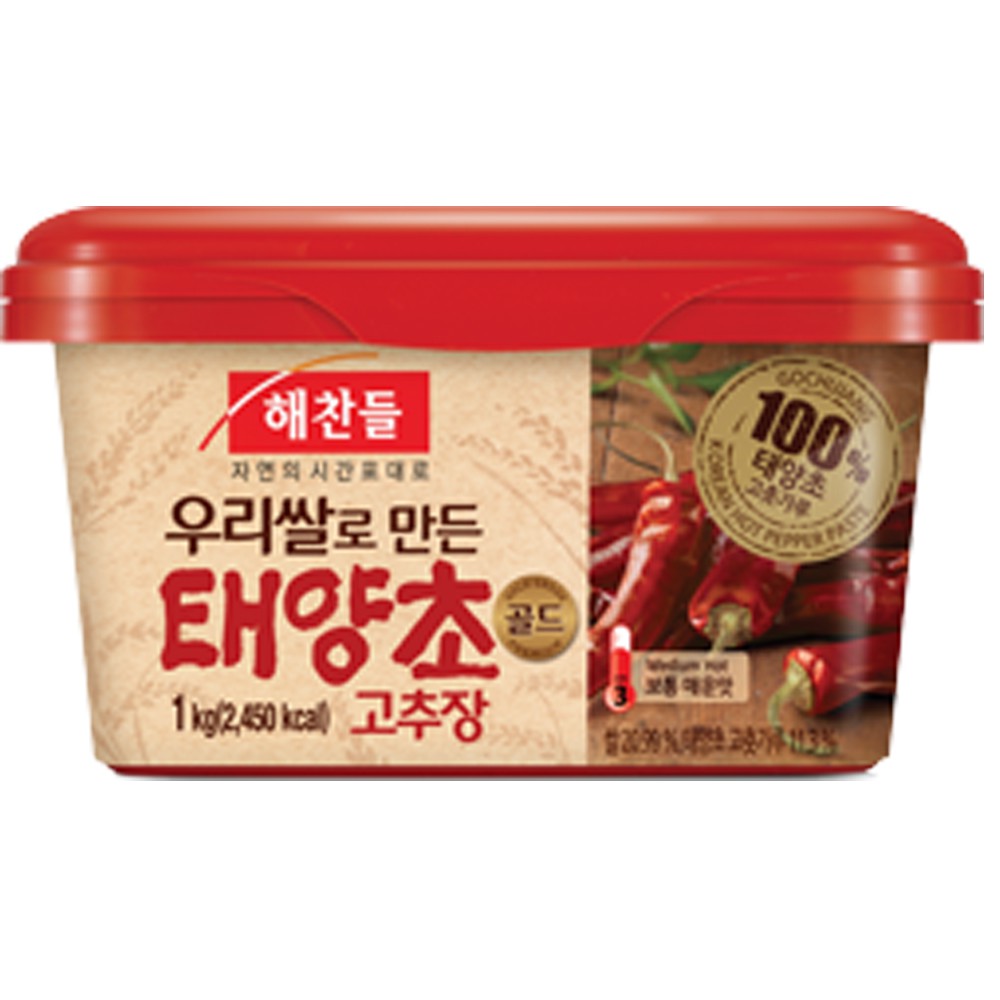
Taeyangcho Chili Sauce 1kg
99,000đ/BOX

Heinz Korean Chili Sauce 325g
39,000đ/BOTTLE
46,000đ/BOTTLE

Yamasa Soy Sauce 1L
85,000đ/BOTTLE
Instructions
Below are clear and detailed steps to help you prepare the delicious and flavorful Korean-style mixed udon noodles to treat yourself and your family:
Step 1: Boil the udon noodles
First, boil enough water in a pot. When the water boils, add the udon noodles to the pot. Cooking time will depend on the type of noodles you use:
- For fresh udon noodles, the cooking time is usually 2-3 minutes.
- For dry udon noodles, the cooking time will be longer, about 5-6 minutes or according to the specific instructions on the product packaging.
After the noodles are cooked to the desired softness, quickly remove the noodles, rinse immediately under cold water to stop the cooking process and prevent the noodles from sticking together, creating a chewy texture.
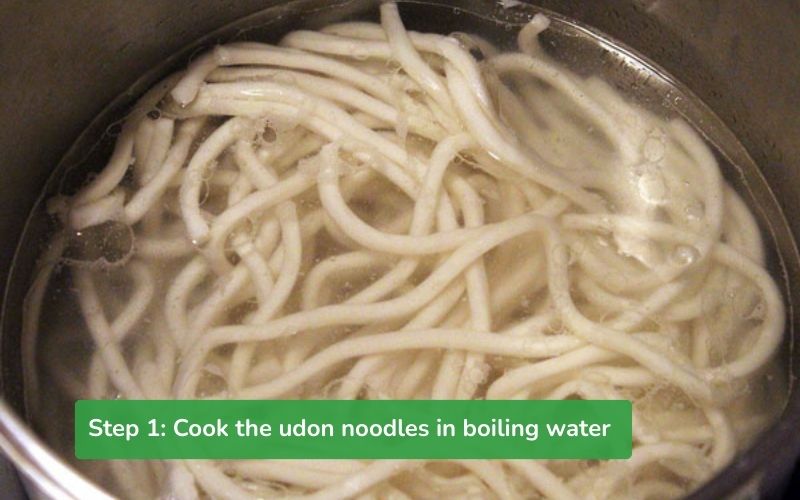
Step 2: Prepare the eggs and leeks
- Boil eggs to your personal preference:
- For soft-boiled eggs, boil the eggs for about 6-7 minutes from when the water boils.
- If you want hard-boiled eggs, extend the boiling time for a few more minutes.
- After the eggs are cooked, remove the eggs and soak them immediately in cold water for easy peeling. Next, peel the eggs and cut them in half lengthwise.
- Then, cut the leeks into very thin slices.
- Lastly, add a sufficient amount of sesame to a dry pan, toast over low heat until the sesame becomes light yellow and fragrant.
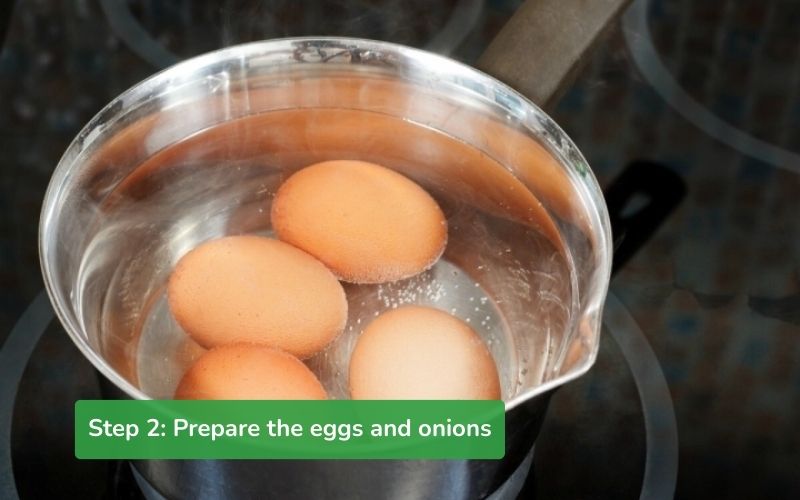
Step 3: Mix the noodles and complete
- Put the boiled and drained udon noodles into a large bowl.
- Add a little sesame oil, Korean chili paste (gochujang) and a little seasoning granules to the noodle bowl. The amount of seasoning can be adjusted to your taste.
- Mix the ingredients and seasonings well until the noodles are evenly coated.
- Sprinkle some shredded dried seaweed, sliced leeks and toasted white sesame on top of the noodles to enhance the flavor and appeal of the dish.
- Finally, pick up the noodles and put them on a plate, place the two halves of the cut egg on top and you can enjoy the delicious and nutritious mixed udon noodles at home.
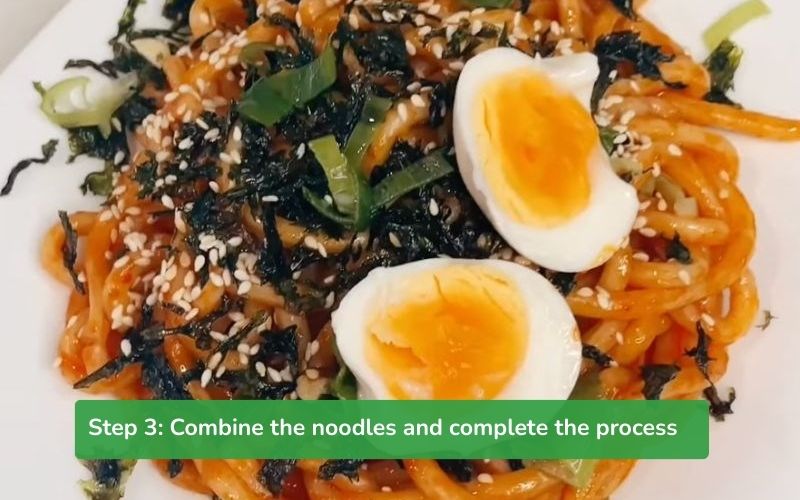
Purchase standard Japanese udon noodle ingredients at good prices at Kamereo
Kamereo is an application that provides wholesale food for F&B businesses. Proud to be a strategic partner of Gyomu Japan – a reputable supermarket chain in Japan, Kamereo offers a rich and reliable source of Japanese goods. Strict quality control processes combined with a modern warehouse system, we are confident in providing fresh and standard quality ingredients.
As an “All-in-one supplier”, Kamereo fully meets the diverse needs of F&B businesses. Not only stopping at fresh and frozen ingredients, Kamereo also provides all kinds of mixing ingredients and specialized kitchen utensils. All necessary products and ingredients are integrated on one platform, making it easy for businesses to find, select and order quickly and conveniently.

Kamereo’s outstanding difference compared to traditional suppliers lies in the application of technology to optimize the procurement process. Kamereo’s website and mobile application not only support businesses in ordering but also provide effective management tools. Features such as multi-store management, flexible order approval, detailed cost tracking and in-depth data analysis also help businesses make smarter business decisions.
Not only bringing convenience and product diversity, Kamereo also commits to stability and reliability in supply. Order support service until 12 o’clock at night and fast delivery before 6 o’clock the next morning help F&B businesses always be proactive in preparing ingredients. With Kamereo, the worry of ingredient shortages will no longer be a problem, ensuring smooth and continuous kitchen operations.
Buy authentic Japanese udon processing ingredients at good prices at Kamereo:

Udon Yamamori 200g
39,000đ/PACK
46,000đ/PACK

Frozen Thick Udon Noodles 1.25kg
79,000đ/PACK

Frozen Udon Noodles 1kg
83,000đ/PACK

Sanuki Udon Noodles 800g
79,000đ/PACK
Conclusion
Above is detailed information on how to cook udon noodles – a Japanese dish with many attractive variations. To make the cooking process at home smoother and ensure a delicious and authentic final product, you can find quality ingredients at Kamereo. Don’t forget to visit our Food and Lifestyle section to discover more interesting recipes and culinary knowledge.
See more:



